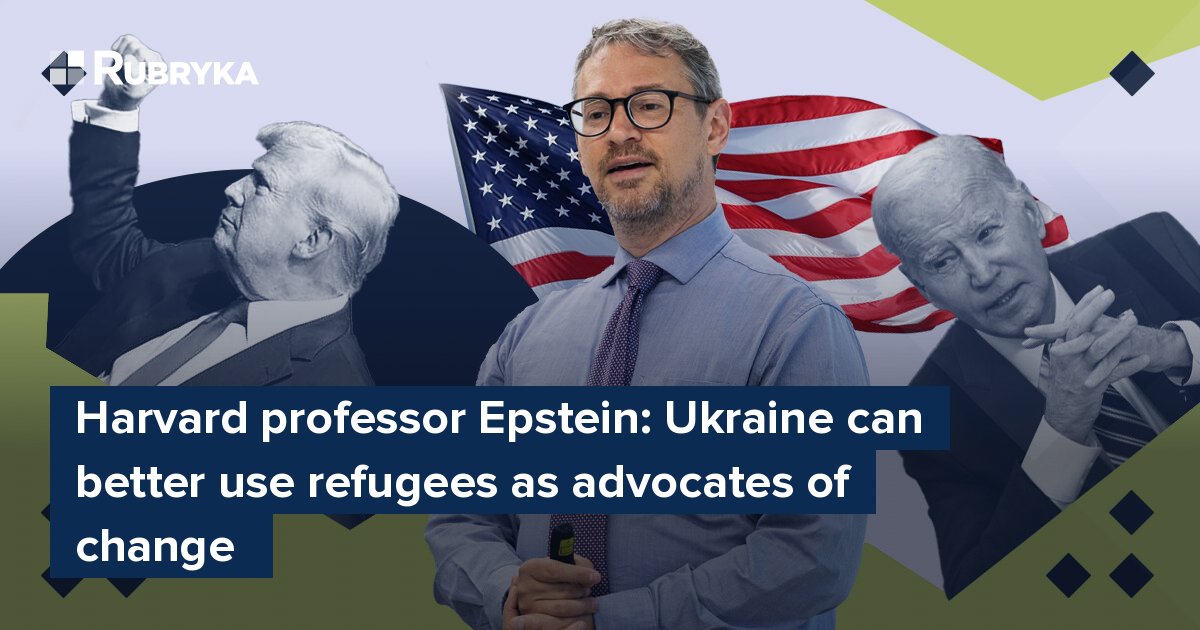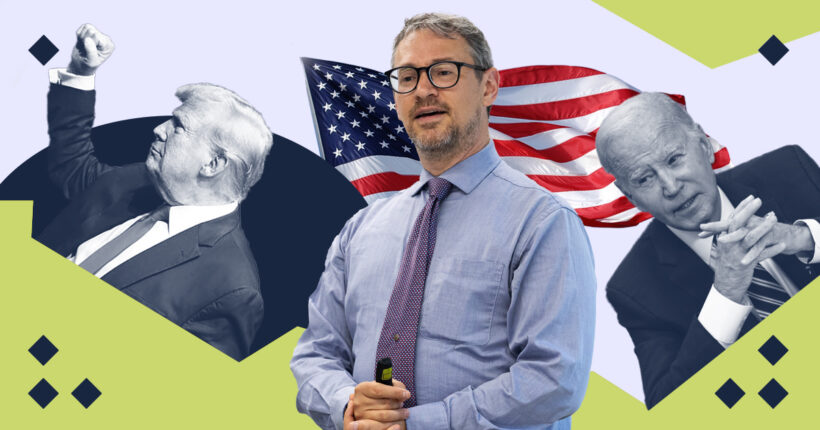
Many Ukrainians believe that aid from the United States to Ukraine is coming slower than it should. Many also think that lifting restrictions to strike inside Russia is long overdue. Ukraine has been trying to argue that some steps should be taken in advance. How do you see these communication signals from your perspective?
There are two big answers to the question. The first concerns political parties, as I've been discussing in my guest lecture at KSE. Trump has changed the Republican Party into a party that is not sympathetic to Ukraine. The party may even be sympathetic to Russian war aims in Ukraine, but certainly not a party that wants to support the Biden Administration in its goals for helping Ukraine. Now, the Republicans have a majority in the House of Representatives. When Kevin McCarthy was still speaker, the House and the Administration asked for a renewal of Ukraine aid for $50 billion in September 2023.
At that time, it became a political football for Republicans to show that they were loyal to Donald Trump by standing in the way of this. This has become a problem not just for everyone in the Republican Party but for many people, especially in the House of Representatives, where there are more pro-Trump politicians than in the Senate. As senators are on a six-year cycle, many have been in the Senate as Republicans long before Trump, and they are not going to follow that pattern necessarily. In contrast, it is the opposite trend in the House. Trump is not sympathetic to the Ukrainian cause; this is the reason why this aid was delayed for six months. I was upset and ashamed to see it delayed. I thought there would be some delay, but I believed it would be resolved before the end of 2023 because of budget deals, so I couldn't believe that in January, it was still going on.
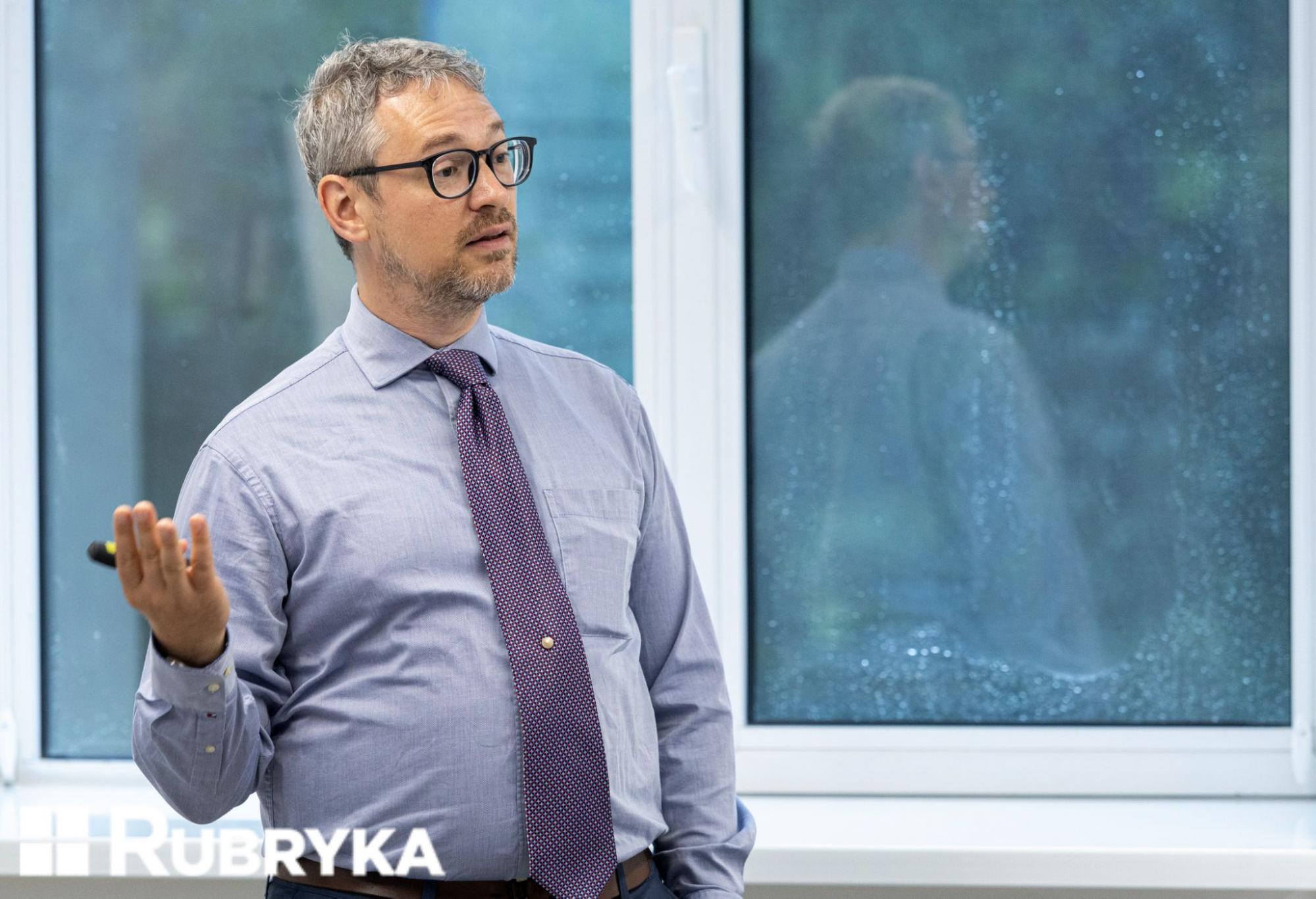
Professor Daniel Epstein giving a lecture at KSE. Photo credit: Rubryka
There's another aspect, though, which is the type of aid and weapons being sent to Ukraine. I mean, certain types of weapons are not being sent. I've heard reports, for example, from Paul D'Anieri, who is an international relations specialist. He's become a specialist on Ukraine, and he is teaching at the University of California at Riverside. So, he told me about comparing the weaponry that is being provided to Taiwan, for example, and the weapons that have been provided to Ukraine. In his view, if Ukraine were getting the kinds of weapons that Taiwan was getting, Ukraine could make much more progress in the war.
The one thing I know for sure is that there are a lot of people in the Biden Administration who worry about a total nuclear war with Russia, which will be an unlimited nuclear war. That is their boundary principle. Let's consider the worst-case scenario. An American soldier fighting not as a volunteer, but as part of the American Army is shot and killed or at least hurt by a Russian soldier on the territory of Ukraine. In that case there would be no way for America to back down from a total war against Russia.
What must be done to avoid the situation where that becomes inevitable, and with regard to nuclear strikes, too? If there is a nuclear strike today by Russia against Ukraine, it would be a horrible thing. However, there would be a chance that there might be no response, and it might be a strike that would not mean anyone would attack Russia with nuclear weapons in response. However, if there's anything happening where there's a nuclear strike and a response — then all of a sudden, it's an unlimited nuclear war.
So, for the Biden Administration, I think this is a binding principle for what kinds of aid are going to be safe to avoid the risk that might even happen. In terms of waiting so long to give permission to use US arms against Russian territory. I don't think the Administration is taking Putin's rhetoric at face value, but I think they're probably thinking about what the United States would do if we were in Russia's position.
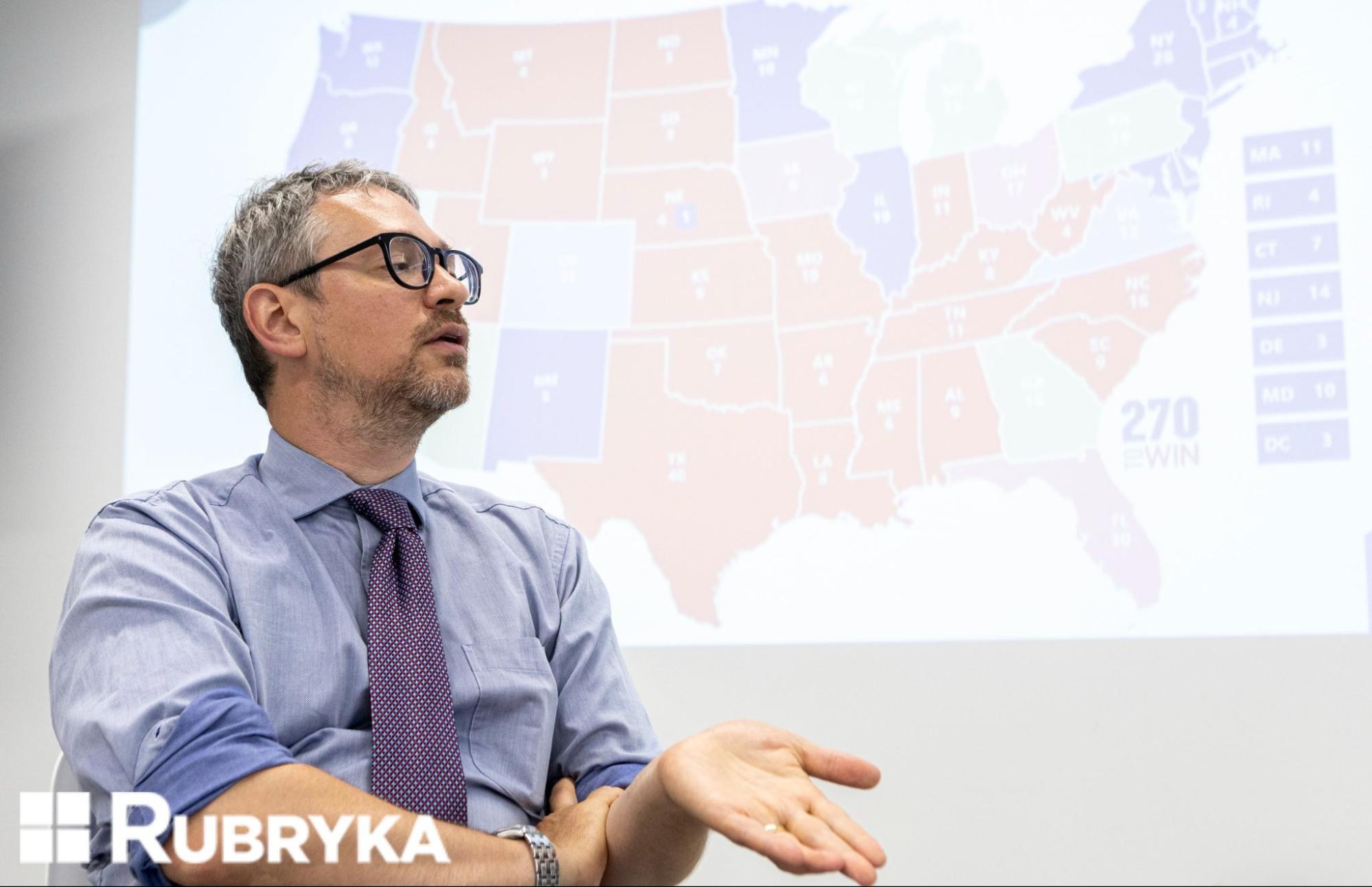
Professor Daniel Epstein interviewed by Vladyslav Faraponov. Photo credit: Rubryka
Don't you think their way of thinking assumes that Putin, his regime, or Russia as a state is rational? I believe everyone still expects Putin to play by the rules, maybe not today or tomorrow, but in a year or so. Imagine that negotiations will take place at some point, and they still expect Putin to play by the rules.
Do you mean if there is a ceasefire and Putin signs it? I agree, people expect him to adhere to it.
I think many people in America believe the same.
You're right. Many people do. I don't think the people who are foreign policy experts in the Biden Administration or whatnot are the majority of them. It's really a problem of academics. International relations theory does not admit being able to hypothesize and make predictions based on states being irrational. It doesn't say states can't be irrational. It just says if states are irrational, don't ask us because we don't have any idea. So, people who are trained in international relations theory expect that states must be rational right at some level. I think with the war in Ukraine, there's a question: Was it rational for Putin to invade Ukraine? I think one way to answer that is to say, it's irrational because why would he want to do that? What reason does Putin have to want to kill or take over Ukraine? You probably know John Mearsheimer. He has his argument. I've actually just presented a paper at the Association's Society for the Study of Nationalities in New York as a critique against him.
What can add up to another way that we could see Putin is rational, which is that Putin's only important goal is to keep the support of the Russian people. In addition, he's not able to offer them a good economy or freedom, and so he offers them a nationalist war. That to me is a convincing reason why I would go to war. It's a rational reason. It's a reason that doesn't care about what happens to the Russian army.
Another perspective is whether Putin is rational or is Russia rational? It can also explain a lot about this war, which is that Putin is totally rational. He's clever. He's a Secret Service officer. He's not stupid about anything. He's used to and was trained and grew up operating within a system he understood, but then he created one. He doesn't know everything that's going on in the system, and it's evident that he got a lot of inaccurate information about how easy it would be to conquer Ukraine. This is what many international relations theories would say: that when a state does something that looks irrational, it's because they had wrong information.
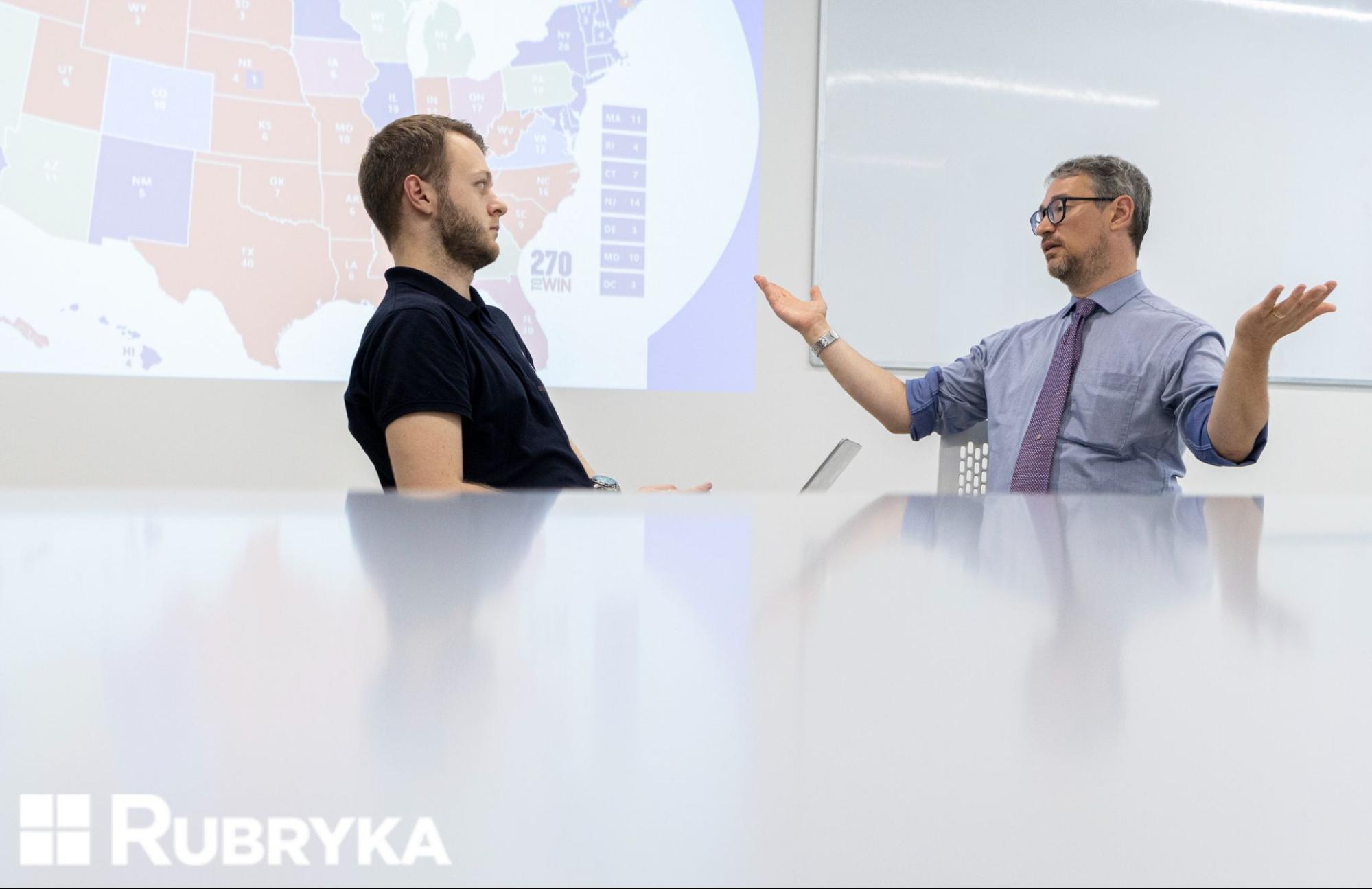
Professor Daniel Epstein interviewed by Vladyslav Faraponov. Photo credit: Rubryka
Let's get back to the House of Representatives. Many in the house claim that, for example, Ukraine received too much aid while the border issue remains unresolved. How should Ukraine advocate for more aid or at least the same amount, as the current financing will run out in late 2024 or early 2025?
I am not going to say something very hopeful, unfortunately. Two factors will determine future aid: first, the American people's attention and the outcome of the elections. The worst thing for America's level of support for Ukraine was the outbreak of this war in Israel and Palestine because Americans are paying way more attention to that now. As long as that is going on, Ukraine is going to be in second place at best in terms of international issues. So, can Ukraine do anything to bring that war to a close? Probably not. In terms of elections, the Ukrainian government or Ukrainian actors should not try to participate in American elections or meddle in elections.
Second, I will explain something I heard from a scholar who is an expert on refugees. His talk was about Ukrainian refugees. He himself is from Bosnia or Croatia. He's got a lot of expertise in refugees from Bosnia, Kosovo, the Middle East, and Africa.
His primary claim is that there's an extensive discourse amongst Ukrainians that people who left should return. Yes. They should come back to help the war effort and contribute to the economy. His research on previous refugee situations where millions of people fled some country and were gone for years during a war demonstrates that most of the refugees never came back. Most refugees have settled in other countries and made a life there. So, think about Ukrainian refugees if they've been in Germany, France, Britain, or the United States for over two years.
It is not quite realistic to think that they'll come back. If Ukrainian refugees integrate into societies, they may not become citizens but participate in civic activism if they have a civic presence not just as refugees and victims but as collective actors interested in participating in politics. Consequently, maybe they could have an essential voice in Germany, France, Britain, and the United States, keeping people in those countries aware of the importance of supporting Ukraine.
That will be relevant to do both in terms of elections or lobbying people in Congress, people who are in America or who are Ukrainian Americans, or people who are there as refugees and have settled there. That's the best thing I can say, but in terms of the Ukrainian government, I wouldn't have any advice.
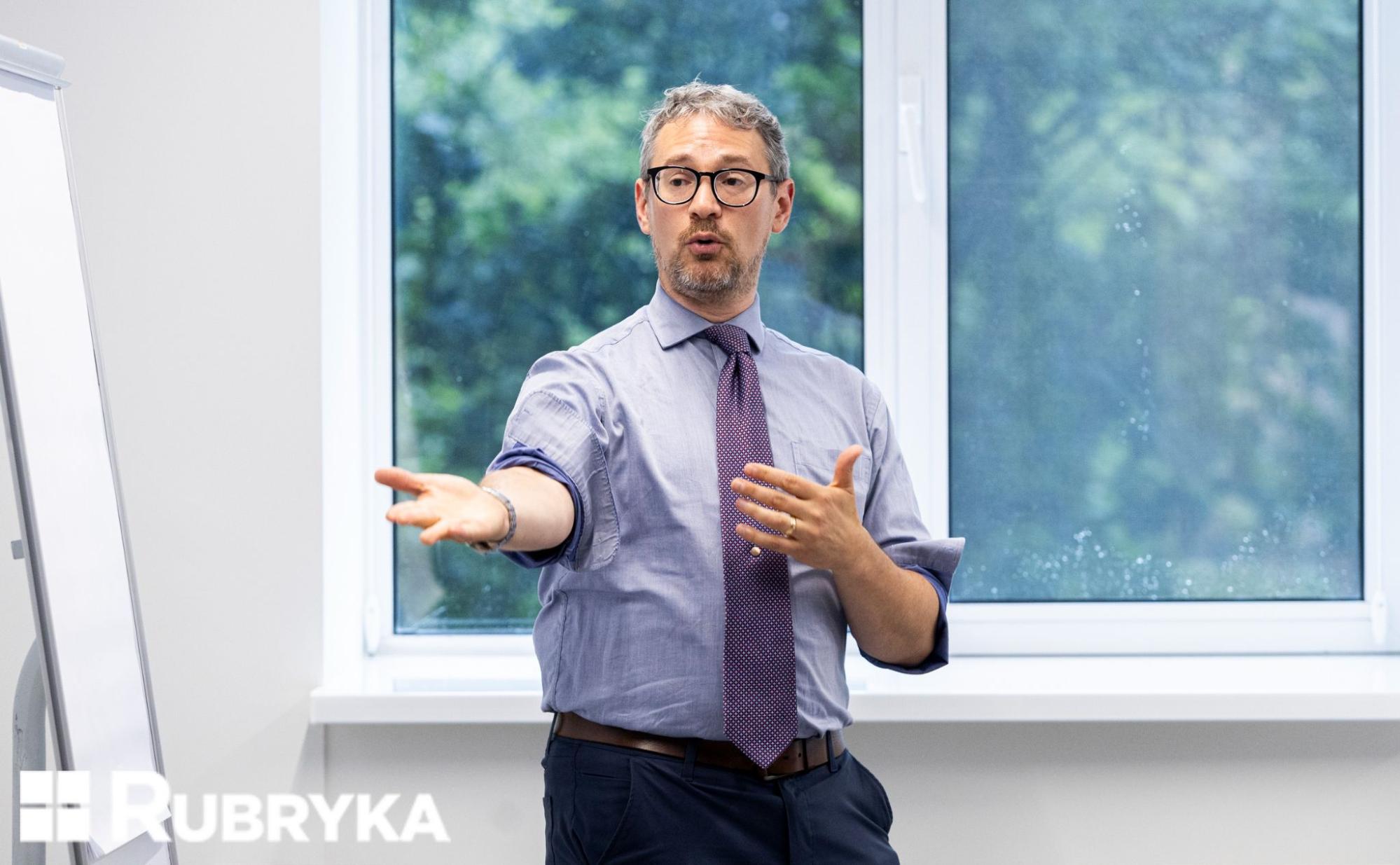
Professor Daniel Epstein giving a lecture at KSE. Photo credit: Rubryka
Many in Ukraine read news about Trump's chances to be reelected and about his charges. However, I don't think we have enough discussion around it in Ukraine. What would be your take on Trump's possible second term?
He would probably cut off aid to Ukraine completely, or it might be the eighth that was already legislated. But I don't think new aid will come. A tiny package could come, like 500 million dollars instead of 50 billion dollars.
For example, some of the military aid but not economic assistance?
Yes, I think not economic aid. One option is that aid that's already been approved will be sent. Maybe not but new aid if it comes it would be some tiny amount. That is the equivalent of cutting off aid.
Okay, I would guess that we might see Trump and Putin standing together as we saw before and Trump saying, you know, 'oh, basically everything that Putin says is really Russian and Ukraine should sign away land. That's entirely plausible.'
The other important thing compared to his last term is that in the House and Senate, the set of Republicans who are in the House and Senate now and would be in his next term are much more sort of Trump-picked Republicans because of the turnover. So he's going to face much less opposition than he might have done in being soft on Russia.
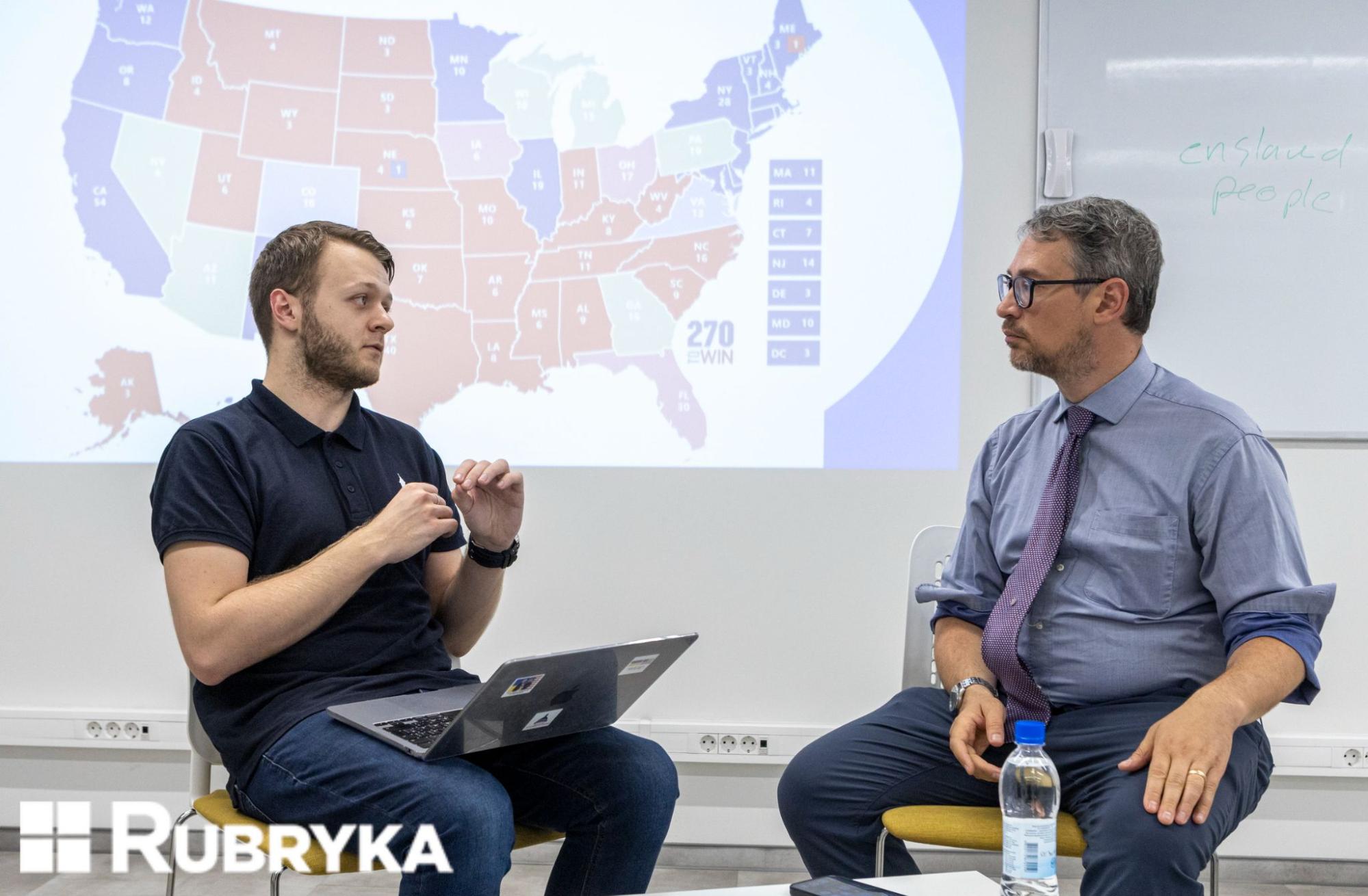
Professor Daniel Epstein interviewed by Vladyslav Faraponov. Photo credit: Rubryka
Let's discuss a broader perspective on other kinds of relationships with the EU and NATO. In the defense budget for the year 2024, there was an interesting amendment that a complete withdrawal from NATO should be approved by either the House or the Senate. What about other foreign policy priorities, as well as the potential end of the war?
Trump is very revolutionary in his rhetoric. However, in this policymaking, he will keep the status quo pretty much the same. So what will the territorial status quo be where the front line is if he's elected when he starts paying attention to this? He'll say, draw the line there.
Also, I think NATO is a part of American foreign policy concepts. I don't think Trump is up for withdrawing from NATO. I don't think it's gonna give him any political benefit. That doesn't mean he won't try to cut funding and be difficult about things to rile up his supporters. Still, NATO is too well institutionalized in terms of policy, so the overall withdrawal from NATO won't happen. Can you imagine what would happen to the US Army bases all over NATO territories that are fundamental to the US Army and US military activities all over the world? So I think that's extreme from literally the US to NATO unless the US wants to have a total revolution in how it wants to project power.
As far as China, so much about the good US policy of China seems to be reactive to what's going on in China. In particular, the government policy is reactive to what's happening in the Chinese economy. I think Xi's turn toward nationalism is determined by the slowdown of the Chinese economy, similar to Putin's turning toward nationalism. There are institutions in the Chinese Communist Party that are seeking a change of leadership, but these don't exist in Russia. So, if the Chinese economy gets really bad, they bring somebody else in, and things could go completely differently. An expert on the Chinese economy could give a much better answer than I could, but we know the economy is slowing down; they have debt and demographic problems.
All of this American policy towards China in terms of actual policy is way more than whether the election outcome is Trump or Biden. If Trump is elected, he's going to have some kind of negative anti-Chinese rhetoric in his public speeches, but then whoever is in charge of China when they sit down together, there is a possibility of some sort of deal between the US and China.
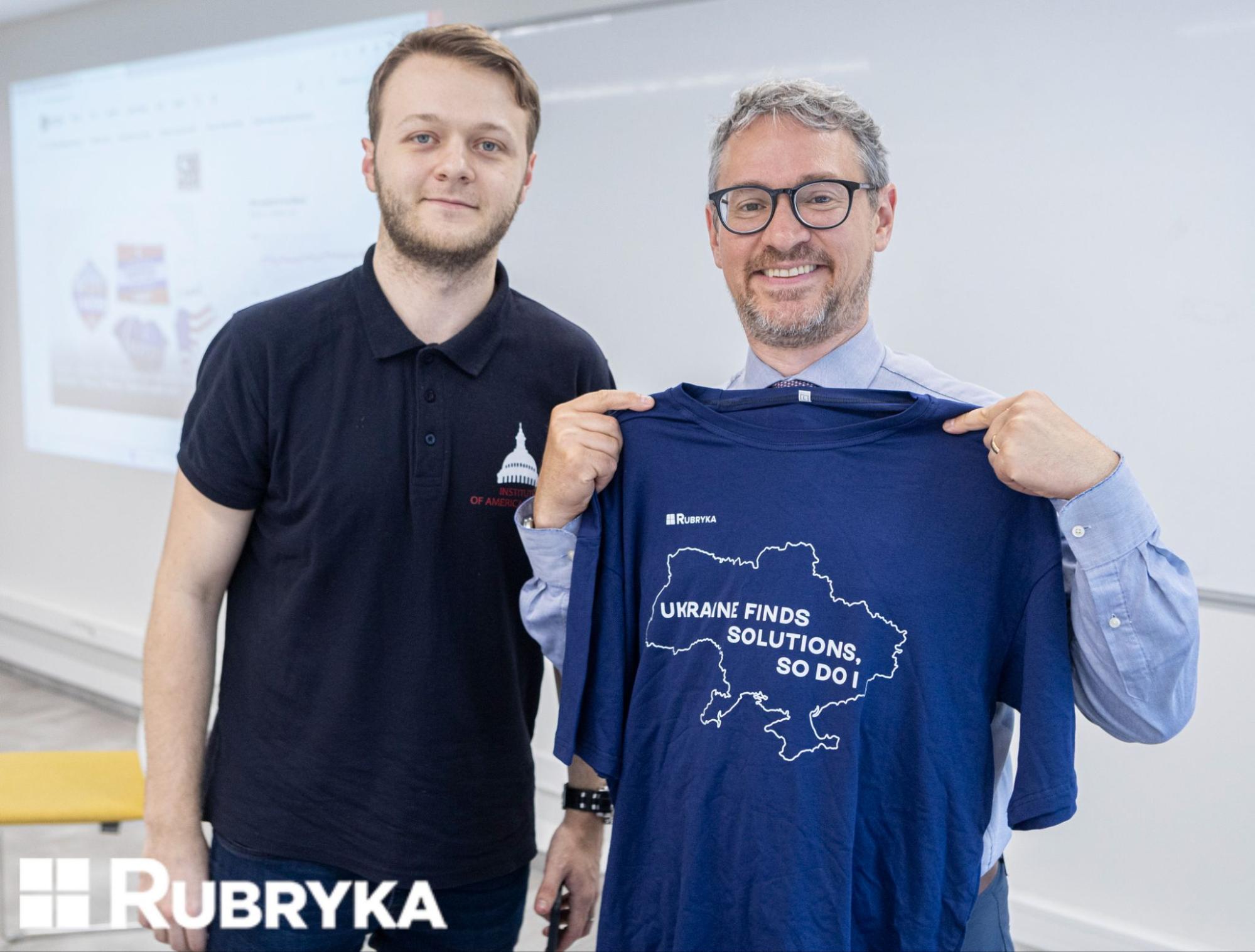
Rubryka presented professor Daniel Epstein with the "Ukraine finds solutions, so do I" t-shirt. Become a member of our community to get yours! Photo credit: Rubryka



